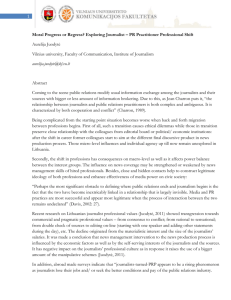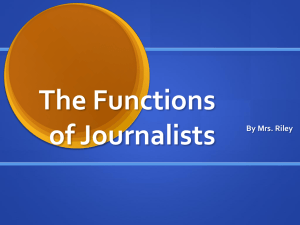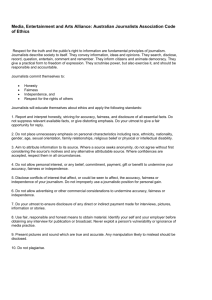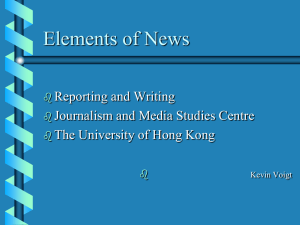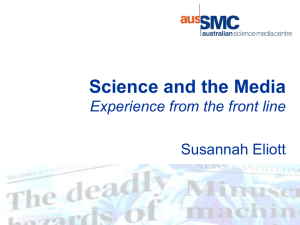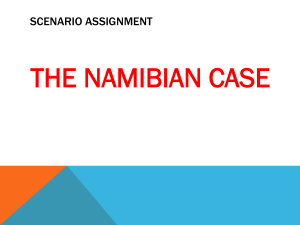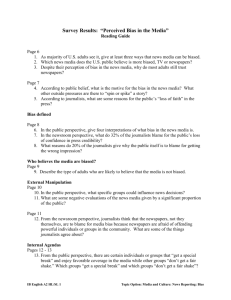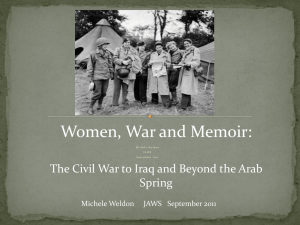Presentation by Brian Cathcart
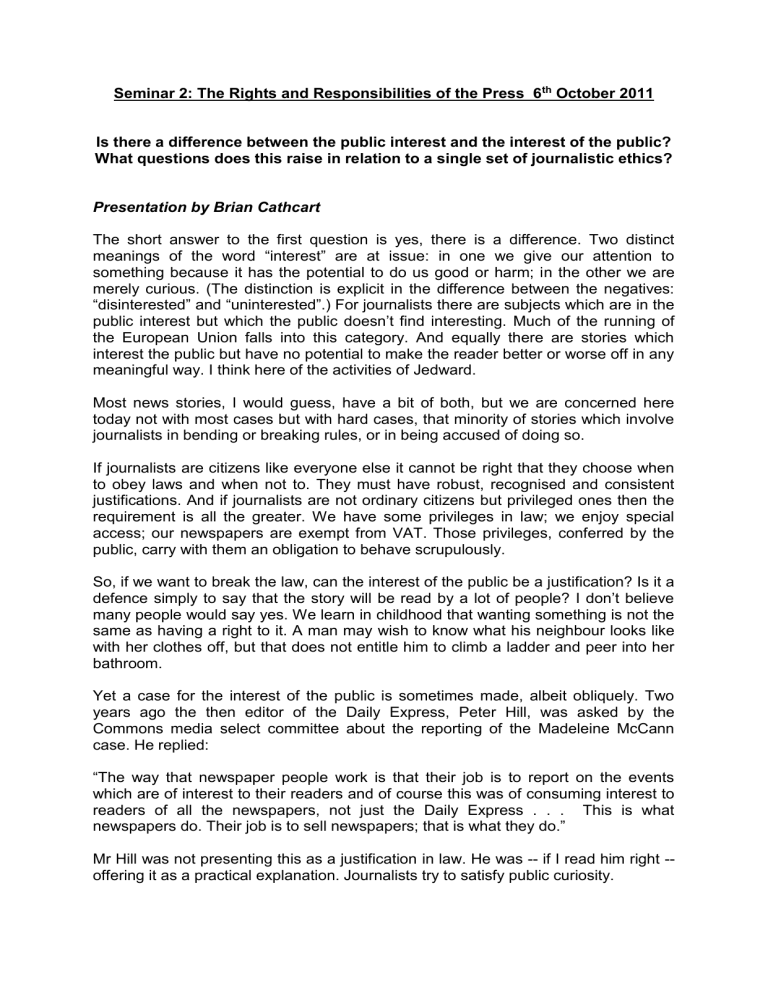
Seminar 2: The Rights and Responsibilities of the Press 6 th October 2011
Is there a difference between the public interest and the interest of the public?
What questions does this raise in relation to a single set of journalistic ethics?
Presentation by Brian Cathcart
The short answer to the first question is yes, there is a difference. Two distinct meanings of the word “interest” are at issue: in one we give our attention to something because it has the potential to do us good or harm; in the other we are merely curious. (The distinction is explicit in the difference between the negatives:
“disinterested” and “uninterested”.) For journalists there are subjects which are in the public interest but which the public doesn’t find interesting. Much of the running of the European Union falls into this category. And equally there are stories which interest the public but have no potential to make the reader better or worse off in any meaningful way. I think here of the activities of Jedward.
Most news stories, I would guess, have a bit of both, but we are concerned here today not with most cases but with hard cases, that minority of stories which involve journalists in bending or breaking rules, or in being accused of doing so.
If journalists are citizens like everyone else it cannot be right that they choose when to obey laws and when not to. They must have robust, recognised and consistent justifications. And if journalists are not ordinary citizens but privileged ones then the requirement is all the greater. We have some privileges in law; we enjoy special access; our newspapers are exempt from VAT. Those privileges, conferred by the public, carry with them an obligation to behave scrupulously.
So, if we want to break the law, can the interest of the public be a justification? Is it a defence simply to say that the story will be read by a lot of people? I don’t believe many people would say yes. We learn in childhood that wanting something is not the same as having a right to it. A man may wish to know what his neighbour looks like with her clothes off, but that does not entitle him to climb a ladder and peer into her bathroom.
Yet a case for the interest of the public is sometimes made, albeit obliquely. Two years ago the then editor of the Daily Express, Peter Hill, was asked by the
Commons media select committee about the reporting of the Madeleine McCann case. He replied:
“The way that newspaper people work is that their job is to report on the events which are of interest to their readers and of course this was of consuming interest to readers of all the newspapers, not just the Daily Express . . . This is what newspapers do. Their job is to sell newspapers; that is what they do.”
Mr Hill was not presenting this as a justification in law. He was -- if I read him right -- offering it as a practical explanation. Journalists try to satisfy public curiosity.
It cannot be right, however, to suggest that because many people were interested in the McCann case it was automatically legitimate to go beyond the law or beyond accepted codes of practice to report the next development. However great the public’s appetite for information on a given subject, it cannot simply dissolve laws or suspend ethical codes. To suggest that is to surrender to lynch law, or, to use a more current point of reference, looters‘ law. As journalists we can only break laws or breach our codes if we expect to deliver to society something more than the fleeting gratification of curiosity or emotion, something that outweighs the offence. We have to show real gain. In other words we have to serve the public interest.
It is a sorry reflection on the state of journalism that many practitioners say they are uncertain about the public interest. As a teacher I am inclined to wonder about the education and training that led to this. But it also seems to me that very often the real confusion is not between the public interest and the interest of the public, but between public interest and commercial interest. Proprietors, editors and newsdesks have been putting sales before scruples in a way that they would not excuse in any other part of society.
The argument is made that it is impossible to define the public interest. In fact every relevant body has done so: Ofcom, the BBC and the Press Complaints Commission to name just three. Some definitions are fuller than others, but they are remarkably similar in spirit. Journalists act in the public interest, they all say, first, when they expose wrongdoing and injustice, and when they protect the public from danger, second, when they prevent the public from being misled, and third, when they reveal information which helps the public make decisions of importance.
It is true that none of the definitions provides absolute clarity for all journalists in all circumstances. But that is asking too much. The most carefully crafted contracts can be disputed in the courts, as can Acts of Parliament -- in fact such disputes are expected. Yet we still write contracts and pass Acts of Parliament. That there can be no perfect definition of the public interest does not mean that we can’t have a workable one in most circumstances.
It is not, in any case, the principles of public interest -- the words and phrases of the definition -- that cause difficulties. More than anything else it is proportionality. To illustrate: could it ever be ethically acceptable for journalists to intercept voicemail messages? The answer in my view is yes, but the return on such an invasion of privacy would need to be proportionate. That is to say that it could only be done in the pursuit of a story of very high public interest. (And I am aware that as the law stands there is no public defence for hacking. I am giving my view on proportionality.)
The courts are already familiar with the work of assessing proportionality. You can find a good example in the judgement given last week in the case of Rio Ferdinand and the Sunday Mirror. The footballer’s privacy had been breached, but was that breach justified by the circumstances? Mr Justice Nicol has set out exactly how he weighed the issue. He appears to have done so with great care and in the end he found for the newspaper, endorsing as he did so the paper’s arguments about hypocrisy and about the England captain’s standing as a role model.
Of course only the hardest of hard cases can be left to the courts. And in any case, given the limited access to justice in this country, only a small minority of cases will find their way there anyway. This brings me to the second question I have been asked to address, about the relationship between these matters and journalistic ethics.
The existence of this inquiry is proof of a failure of public trust in journalism -- not just a failure of trust in one newspaper but in large parts of the industry, and in its ethical standards and the mechanisms which exist to uphold them. This failure did not occur overnight last July. It has been coming for a long time and is associated recently with scandals including those of Robert Murat, Kate and Gerry McCann and Christopher
Jefferies.
We cannot restore trust with denial or with a cover-up. No doubt regulation of some sort has a part to play, but I am convinced that nothing will make a greater difference now than a change in the mindset and habits of journalists themselves, a change which acknowledges the primacy of the public interest. I’m sure that a majority of journalists, in their hearts, are fundamentally motivated by the public interest, but having it in our hearts is not enough. As journalists we do not accept that it is enough for MPs or doctors or railway operators to mean well. We need to know that they operate in ethical and socially responsible ways and that they are accountable for what they do.
If journalists, when they work on stories of all kinds, learn to consider the public interest in the same way that they consider (or at least that they should consider) fairness and accuracy, or the risks of libel and contempt, that would be a step towards rebuilding trust. Many will say they already do this, but we need to go further. We need also to be transparent and accountable, as we ask others to be.
For example, ethical and public interest considerations should be frankly discussed in the newsroom when they arise, and those discussions and any decisions that follow should be placed on the record at the time. That way, not only would ethics be taken more seriously, but there would be proof that it was. Would this slow down newsroom? Perhaps, but not much in the electronic age. And we insist that the police and doctors do such things; are we more important than they are?
That is an example of a measure to embed the public interest and the ethical codes in journalistic practice in a way that will help restore public trust. It is certainly not the only possibility, and no doubt others will be discussed. But make no mistake, there is no ducking change in journalism now.
If these issues continue to be blurred, if the public interest is treated as an afterthought, a figleaf to be retro-fitted to stories for the benefit of the courts -- as we know it sometimes is -- and if the public is left to continue with the impression that much of our journalism is about what sells and nothing more, then restoring trust will be much more difficult, and inevitably it will depend much more on the force of regulation.
ENDS


